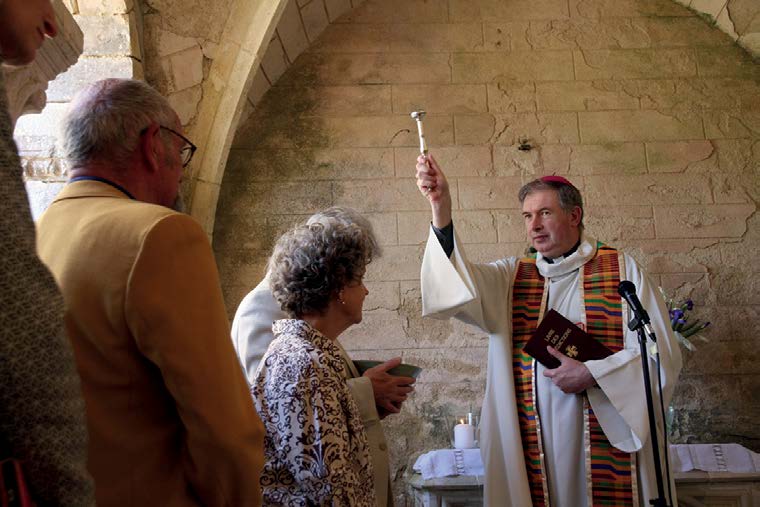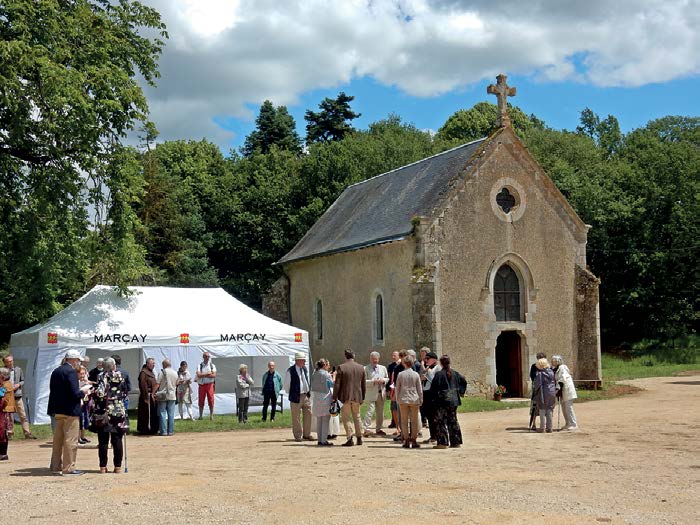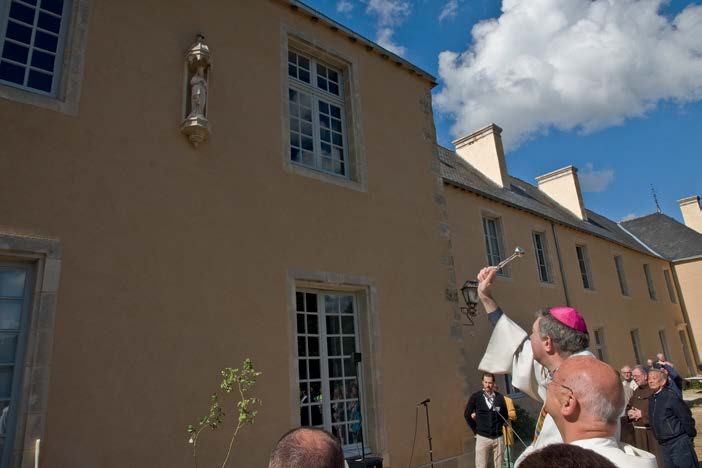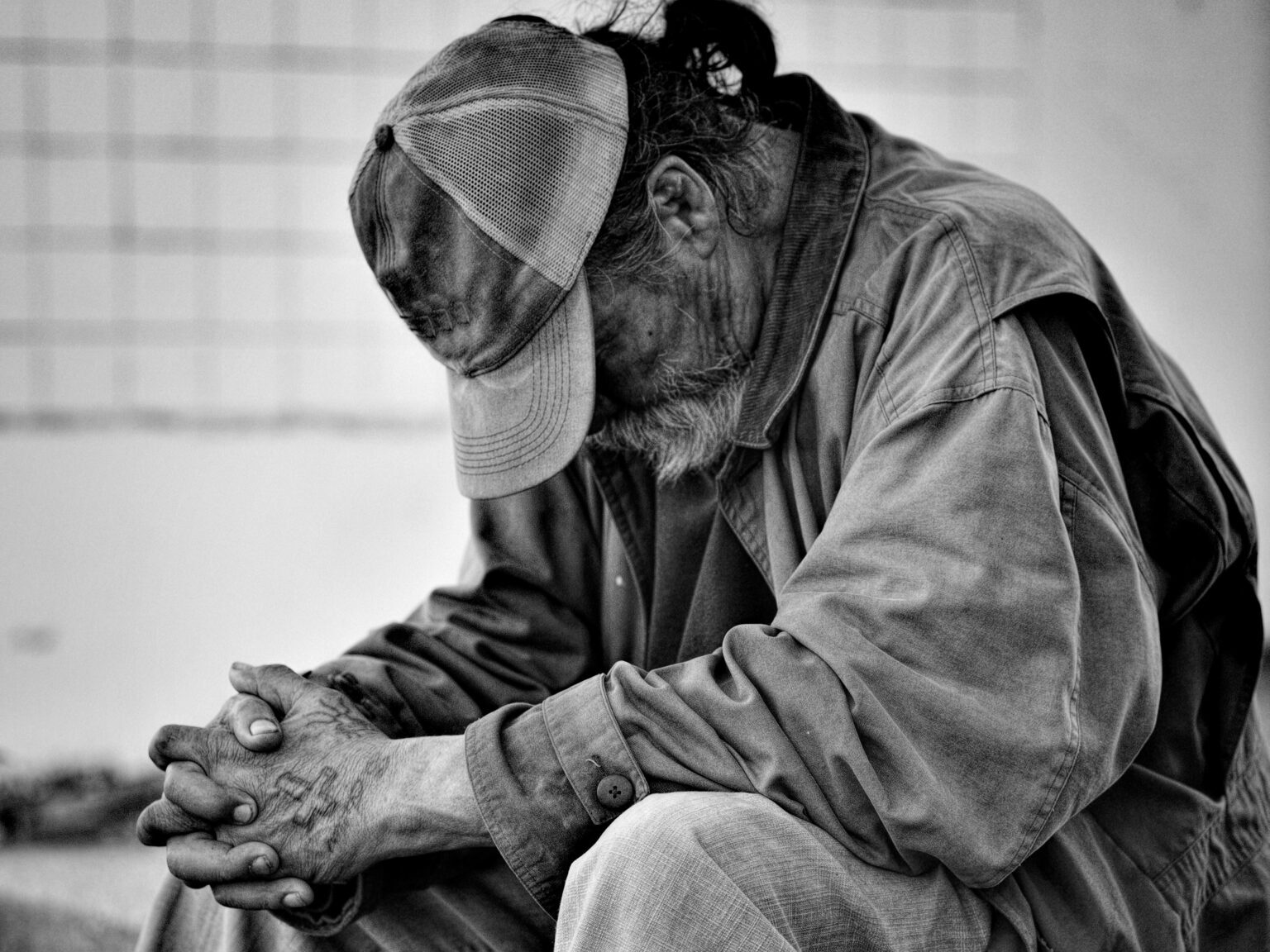If you look at one of the photos of the beautiful blessing of Bonnevaux last month you will see the large group of community, friend and neighbours packed into the long cloister. They were listening to one of our principal speakers of the day speaking about the vision of this new centre of peace that is to become no less a centre for peace. Those in the front row are looking up at a single point immediately above the speaker’s head. Not in inspiration, though, as much as in fear. The speaker had been placed immediately under a nest of swallows in the vaulted ceiling where some newly fledged arrivals were being cared for by their parents. They were showing activity during the talk and those of us in the front began to fear that the birds above the speaker might decide to drop down a message or two of their own.
They did not. And so this part of the benediction of Bonnevaux passed smoothly to the next. But if the embarrassing event had happened what would have been lost? Would it have spoiled everything or just shown us that the best prepared plans remain vulnerable to the unexpected? It helped us in that moment, however, to remember what blessing means. Blessing does not come down from above as much as it is transmitted from one to another by our genuine presence to each other and our collective faith in the project. We are blessed through our friendship and hope to realise what Bonnevaux can become. The best benedictions are horizontal. If a message from the bird-nest had fallen it would not have spoiled the blessing. But we would have been reminded of how the human entwines with the natural world and our well-made plans with the randomness of the universe. We would have smiled because it would have told us that mistakes, failure and accidents are all eventually part of the single great blessing that is life.

Shortly before the blessing of the first phase of our renovation of Bonnevaux, the Guiding Board had decided on ‘Contemplative Christianity’ as the WCCM theme for the coming year. We felt that this to be an important reminder, not just for the Church but for the world. Christianity fulfils its mission in a world of many faiths to unite people in the universal truth. Part of this truth is that love, peace, joy and forgiveness are not just dreams or occasional lucky moments in life. They are essential elements of human nature that Christ taught by word and example. It means that, however peaceless and divided we may be, individually or collectively, our true nature can ‘become God’, as the early Christian teachers daringly said. We can always rise from our selfmade ruins. Like Bonnevaux, we too can be renovated.
“Before I was me I was God in God And can be again If I die to my me”
The Cherubinic Pilgrim, Angelus Silenius, transl. Anrew Harvey
To help understand the need for a universal understanding of contemplation, we have launched a new WCCM podcast – called “Contemplative Revolution”. We have called it this because contemplative Christianity is unachievable unless it is held in the gentle grip of the continuous revolution of the gospel’s wisdom and values. The podcast offers regularly updated teachings from the many gifted teachers with whom our community is blessed. I urge you to sign up for it because it will help stimulate and enrich the hope and vision in you that we need to share with the world.
Revolutions come and go. They seek the highest goals of human perfection and then begin to splutter,
lose height and crash. Most political revolutions in history reverted to the very forms they once rejected. It is a sadly frequent outcome of idealism that we are all familiar with at a personal level, in relationships or in our commitment. How many of us have not seen ourselves fall short of the generous selflessness of our initial enthusiasm? We gave ourselves without counting the cost. Then little by little….. compromise, excuses, complaints, the demand for reward or recognition.
Revolutions – in individuals or societies – have complex causes. They happen when the existing order of things begins to dismantle in several places simultaneously. Fear and uncertainty begin to spread. In society those in power become alienated from each other and people see the calibre of leadership declining. In ourselves, the values and disciplines that give life harmony and meaning loosen. Injustice, imbalance and deception multiply. Feelings of resentment and shock ensue similar to what a child feels when it is treated badly. Conditions ripen for the coming of false prophets. Voices of protest form narratives and slogans that crowds can understand. Disappointment and a sense of betrayal scratch out a feeling of emptiness in the fear of a coming precipice.
Karl Marx had a vision comparable to that of Jesus: to realise the essence of Man in a classless society.
Karl Marx had a vision comparable to that of Jesus: to realise the essence of Man in a classless society. It inspired the Communist revolution. France and China entered their revolutions with high ideals. But quickly, the large vision contracts to shortterm advantages and the silencing of dissent. The dive upwards into higher consciousness falters and, feeling that we are losing our breath, we head downwards to the surface again. All revolutions fail, including the gospel’s metanoia (the conversion of consciousness itself), if we don’t learn to breathe underwater. This means that learning that we are more than our thoughts, even our best ideas. Nor are we limited by what we imagine. Not only can we survive the stilling of thought and the silencing of mental chatter; but we soar in all directions, losing nothing that we have lost. But to break into the contemplative clear sky, we have to have the realisation of dying to self-consciousness and being reborn. The life we find when we have lost our life is life indeed. Or, as a koan puts it: the dragon roars in a dead tree.
Passing through the paradox-portal of reality, we discover that contradictions co-exist. We are set free from the exclusively dualistic mind and from the compulsive search for happiness in pleasure alone. We learn that joy and sorrow (as we label them) are equally, sometimes simultaneously, revelatory. Everything teaches. Nothing is wasted. Seeing this impacts everything, as a revolution or an earthquake does, including our meditation practice. We no longer bargain with meditation, threaten to leave if we don’t get what we want, panic when nothing happens or try to fill the desert with fantasy oases. The motivation of our meditation changes. A wisdom not just our own is born, almost shyly, of interior renunciation. It now seems so obvious. By learning to let go of all the stages – the dream, the failure and the intermittent reward – the poverty we dreaded now carries a peace beyond our understanding.
“The life we find when we have lost our life is life indeed”
An entirely new class of experience unfolds. We may have tasted it briefly before but it is unfamiliar. If we have a language and belief system to help, they can help to find meaning in this contemplative experience. If not – and many who learn to meditate today are suspicious of all belief – the experience itself will suffice. A contemplative Christianity can teach the way to this experience and offer an understanding of it but patiently and with self-restraint.
Our sense of global emergency is triggered by our lifestyle. Speed, stress, addiction, virtual reality and
the sense of alienation block out the contemplative experience. Without it, life, reduced to merely materialistic dimension, bleeds meaning. In contrast, John Keats wrote that life is a ‘perpetual allegory’. But how many today are educated to understand this, to see how different dimensions reflect each other, bringing us deeper into the mystery of all existence? I think he means that life is eternally new as it unfolds to us its limitless connections. Beauty, for example, is the revelation of the whole in a part. We cannot help but love the beautiful. But love for one part expands to include each of its neighbours. To love one thing leads to loving everything. With love, meaning grows, not through an ideology or by defining ourselves against others but through boundless felt connections.
Everything is meaningful in relationship to something else. To have entered upon a path of contemplative experience is to be going beyond whatever we arrive at. It is to know the peace of ‘being on the way’ rather than the pressure of trying to get somewhere faster by competing with others.
The Greek word for this is epektasis. Gregory of Nyssa called it unceasing evolution in eternal happiness. St Paul used it too to describe the ‘always something more’, ‘always going beyond’, aspect of a life that can breathe inside the spiritual dimension. The contemplative scientist understands it. As does the self-transcending artist or the parent who puts the needs of their family before their own career. It describes life as uncontainable and self-renewing. Religious leaders often find it hard to understand when meaning becomes enshrined in beliefs, ritual and structure and separated from real experience. The more one talks about what one has not experienced, the more unreal and unconvincing it sounds.
A contemplative Christianity has to learn to confess its own large areas of sinfulness before pointing out splinters in others’ eyes. This is not self-laceration but the humility present in every teaching of Jesus and in his risen presence. Without this humility – what quicker way to humility is there than a daily fidelity to a contemplative practice? – the risk of the anti-Christ grows.
It is strange that the notion of the Anti-Christ appears so early in the life of the Church, in the first letter of John (2:22). An angel of darkness dresses up as an angel of light. Negation disguises itself as truth. The wolf sneaks up in sheep’s clothing. This is the shadow of Christianity itself that crucifies Christ, in the ways we are tempted by power, corruption and hubris: anti-semitism, the Crusades including the Childrens’ Crusade, the Inquisition, wars of religion, cover-up of clerical abuse.
Christianity, of course, is not the only religion in which dark forces can take over. Every religion today needs to be simplified, purified, restored to its contemplative core. Each one must take responsibility for this. In the meantime, religions do better not to criticise each other but to renew themselves.
A good way to renew a contemplative Christianity is to start a community. Seeds of new community are always trying to be born in spiritual traditions. What is new has power to inspire. In the World Community the weekly meditation group has long been a way in which meditators have seen the community that meditation creates and taken the risk to share it with new people. Meditation groups can become too cosy. It is easier to receive than to give. But at some point these two aspects of grace call to be reconciled.
Contemplative Christians know what grace means: to follow the teacher and go we know not where, to
share what we have received, to give what we think we don’t have. This demands the opening of the eye of the heart. At the blessing of Bonnevaux one of our most generous donors to the project said that, when he first considered it, he felt, ‘this is more than we can handle’. Or rather, he said, this is what his head told him. His heart said otherwise. Bonnevaux, he said, is first understood from the heart.
“Every religion today needs to be simplified, purified, restored to its contemplative core”
Community, like a family or a good workplace or village, is a manifestation of love. The heart, which speaks the language of love, has reasons that reason cannot compute. Each day in community we engage, in every encounter, with a part of the universe’s infinite web of relationships. At times we glimpse this big picture within the life of the community life, if it is trying to be a community of love. But, at other times, we think how much easier it would be to live alone. Even in community (or family or work), you can stop expanding in the web of love because your ego decides to seek a safe, separate identity. This occupies a space where you can criticise others and protect yourself. The ego forever seeks separateness (its ancient habit). The self, however, courageously seeks solitude as the means of true, loving relationship. If I cannot be myself as I am I cannot accept you as you are.
Egotism rejects grace. It refuses the gifts that flow unpredictably and unconditionally from the universe into our wounded lives. It fears grace and pollutes it by trying to control it on the ego’s terms. Often it even interprets grace as a threat and demonises it. But whenever the firewall of egotism is breached, even in part, by contemplative experience, grace begins to work wonders.
But grace is not just a feel good factor in the spiritual life like a period of meditation in which distractions fade and peace rides high. It is not what Bonhoeffer called ‘cheap grace’, which he called the ‘mortal enemy of our church’, the kind of grace that we give to ourselves. Grace at low cost once shaped a certain kind of Christianity. The conditions and institutions that allowed it to flourish are disappearing. A time of radical disruption has begun without easy answers and big demands for renunciation. It is the first days of Contemplative Christianity. One aspect of the contemplative mind is the ability to live peacefully without certainty.
As always, what matters is not changing external realities but learning how to deal wisely with them. The heart of Christian faith reminds us of this from the beginning – how Jesus accepted his destiny and transformed the deepest dark to light. It is how James, ‘the ‘brother of the Lord’, understood the meaning of suffering:
“My Christian brothers and sisters, you should be happy when you have all kinds of tests. You know these prove your faith. It helps you not to give up. Learn well how to wait so you will be strong and complete and in need of nothing.”
Like Simone Weil he sees meaning in suffering. She thought that the greatness of Christian faith is not that it seeks a supernatural remedy for suffering but a spiritual use for it.’
Sustaining this insight requires a considerable depth of peace, which is the fruit of prayer, fellowship and being responsibly engaged with the day-to-day tests of life. Then the peace at the heart of the contemplative revolution becomes our own contribution to the turbulent social revolution we are passing through. When the future seems disturbing we need this interior depth to deal with the immediate issues of life without losing sight of the guiding principles needed for the long journey ahead. Community is the daily school of balancing the short and the long-term vision. One of the greatest masters of this wisdom in the Christian tradition is St Benedict.
For Benedict the rhythm of daily life holds the secret of remaining tuned into reality (‘obedient’), steady (‘stable’) and continuously growing (‘conversion of life’). Respecting the synergy of body, mind and spirit is the meaning of the daily management of time and tasks. Time to read, time to work, time to pray. It is as simple as that. Contemporary lifestyles show, however, that we feel it to be elusive and unsustainable. Yet, like a daily meditator in any walk of life, Benedict understood that the best way to achieve a natural, healthy rhythm of life, interiorly and externally, is to prioritise the times of prayer. It is when we see, as John Main said, that the ‘times of meditation are the most important times of your day’, that the contemplative revolution has swept us up into itself and we become this new kind of revolutionary and force for peaceful change. We become what Christians should always be, practioners rather than preachers.
Contemplation is a life-choice that doesn’t provide answers. But nor does it demand blind allegiance to an ideology, as does the major alternative today, fundamentalism, with its false and divisive simplicities. Instead, it requires a sustained vulnerability of mind and heart, permitting us to be penetrated by a new expression of reality. It requires a detached approach to institutions and structures and an interior discipline supported by the love and forgiveness of your fellow-pilgrims.
Contemplation is the antidote to fundamentalism in all its forms. Woven into daily life, a contemplative practice sets off an alarm bell when the tendency is triggered to run from reality into the false consolations of fundamentalism. The dangerous one is to absolutise ‘us and them’. When states shut their hearts to a refugee crisis, when leaders play the race card to enflame the prejudiced. When religious people invoke God to exclude gay or divorced people from their fellowship. In these reactions, we reject the amazing contemplative gift that transforms humanity through seeing ourselves in others and others in ourselves. This gift is the vision of God.
Other-centred attention is the faculty that opens access to the web of reality, in which everything is connected, and which we call God. The worldwide web of the internet is astounding but only a miniscule reflection of the great communion revealed by the contemplative vision of reality. In this great communion, if we are awake and present, we are taught by the simplest things: a walk by yourself around the lake, an evening with community and guests, the rhythm of meditation and prayer during the waking hours of each day.

In the year 2000 a million actual suicides were recorded and there were twenty million attempts. For
these – and for many others harming themselves in our global culture – life became, as it did for Hamlet as he considered the same option, ‘weary, stale, flat and unprofitable’. At the core of this mental state is a desperate monotony and boredom such as every addiction eventually produces. The cure is not to increase the dosage or multiply the ways of self-distraction. It is to find a therapeutic repetition that is energised by the rhythm of life. It is this inter-weaving that renews the blessed immediacy of our relationship to reality.
We are told to pursue happiness and fulfilment. But we can only pursue them by waiting for them. It is in stillness that the most real contact happens. Only contact with the great communion ‘delivers us from evil’. By breaking the cycle of fear (it doesn’t matter whether the swallows drop their message on the speaker), of desire and anger and by dissolving the fixed patterns of our self-defeat, we are sent back to live, not fight life. We find the meaning of good work. The inevitable disappointments, fears and sorrows of life dissolve into a new hope and joy.
And, in each moment of defeat, it summons up the certainty of a second chance, the liberation from the law of karma by a love that can neither leave us nor punish us: because it is a perpetual beginning.
With much love,






